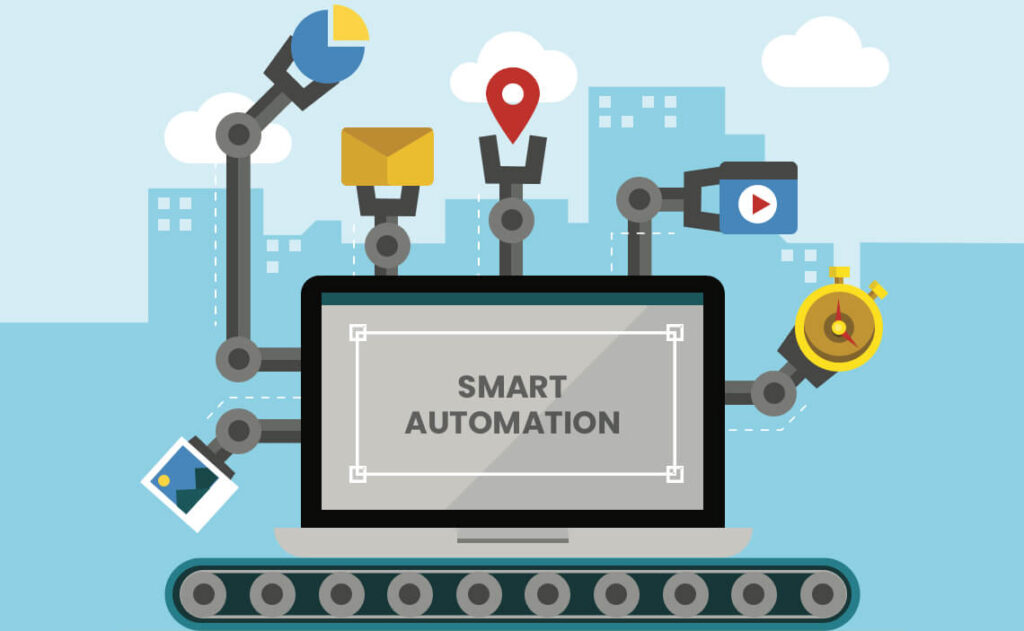Smart automation for businesses
In today’s fast-changing digital world, companies need speed, efficiency, and accuracy to stay ahead. Smart automation for businesses.

Introduction: Why Automation is Essential Today
Every business, whether small or large, faces challenges like repetitive tasks, high costs, and human errors. Smart automation for businesses. By using automation, companies can save time, improve productivity, and provide better customer experiences. Smart automation for businesses.
Technology has reached a stage where artificial intelligence (AI), machine learning, and advanced tools can perform tasks faster than humans without mistakes. Smart automation for businesses. This shift is not just a trend but a necessity for businesses to survive and grow in a competitive market. Smart automation for businesses.

What is Smart Automation?
Smart automation means using advanced technologies to handle repetitive, manual, and time-consuming tasks automatically. Smart automation for businesses. Unlike traditional automation, which only follows simple commands, smart automation includes decision-making using AI and data analysis. Smart automation for businesses.
For example, an e-commerce company can use chatbots to answer customer queries instantly instead of waiting for human agents. Smart automation for businesses. A finance company can automate invoice processing and fraud detection. Smart automation for businesses.

Benefits of Smart Automation
1. Saves Time and Money
One of the biggest benefits is cost reduction. Smart automation for businesses. Tasks that usually take hours can be done in seconds with automation. Smart automation for businesses.
2. Reduces Errors
Humans make mistakes when handling repetitive tasks. Smart automation for businesses. Automation ensures 100% accuracy, improving trust and reliability. Smart automation for businesses.
3. Improves Customer Experience
Customers expect instant responses and solutions. Smart automation for businesses. Chatbots, automated emails, and self-service systems make customer service faster and smoother. Smart automation for businesses.
4. Increases Productivity
When employees don’t waste time on repetitive work, they can focus on strategic and creative tasks. Smart automation for businesses. This directly boosts innovation and growth. Smart automation for businesses.
5. Scalability
Businesses can scale operations without hiring too many people. Smart automation for businesses. This means faster growth at lower costs. Smart automation for businesses.

Examples of Smart Automation in Different Industries
E-Commerce
Order tracking, inventory updates, and customer queries are handled automatically. Smart automation for businesses.
Healthcare
Appointment booking, digital records, and even AI-based diagnosis support are automated. Smart automation for businesses.
Finance
Automated fraud detection, loan approvals, and data analysis speed up the banking process. Smart automation for businesses.
Marketing
Email campaigns, social media posting, and lead nurturing are automated using advanced tools. Smart automation for businesses.
Manufacturing
Robotics and IoT-powered automation improve efficiency and reduce production costs. Smart automation for businesses.

Smart Automation Tools Every Business Should Use
CRM Automation (HubSpot, Zoho, Salesforce) – Automates sales and customer management. Smart automation for businesses.
Chatbots (Drift, Tidio, Intercom) – Provide 24/7 customer support. Smart automation for businesses.
Marketing Automation (Mailchimp, ActiveCampaign) – Automates emails, social media, and ads. Smart automation for businesses.
Finance Tools (QuickBooks, Xero) – Automates invoicing and reporting. Smart automation for businesses.
Project Management (Asana, Trello) – Automates task allocation and reminders. Smart automation for businesses.

How to Implement Smart Automation in Your Business
Identify Repetitive Tasks
Make a list of daily manual tasks. Smart automation for businesses.Choose the Right Tools
Select automation software that matches your business needs. Smart automation for businesses.Start Small
Begin with small automation projects and scale later. Smart automation for businesses.Train Your Team
Employees should understand how automation helps them instead of replacing them. Smart automation for businesses.Measure ROI
Track time saved, error reduction, and cost efficiency. Smart automation for businesses.

Challenges in Smart Automation
Employee resistance to new technology. Smart automation for businesses.
Data security and privacy issues. Smart automation for businesses.
Need for continuous updates and monitoring. Smart automation for businesses.

Future of Smart Automation
The future is AI-driven, where automation will not only perform tasks but also make smart decisions. Smart automation for businesses. Imagine a system that predicts customer needs before they ask or software that fixes errors without human help. Smart automation for businesses.
Technologies like AI, IoT, Blockchain, and RPA (Robotic Process Automation) will redefine industries. Smart automation for businesses.Companies that adopt these innovations early will lead the market. Smart automation for businesses.

Real-Life Case Studies
Amazon uses robotics and AI for warehouse management. Smart automation for businesses.
Netflix automates recommendations using AI algorithms. Smart automation for businesses.
Tesla automates car manufacturing with advanced robotics. Smart automation for businesses.
Banks automate fraud detection, saving millions every year. Smart automation for businesses.
Final Thoughts
Smart automation is not about replacing humans but about empowering them. Smart automation for businesses. It allows employees to focus on creativity, problem-solving, and customer care while machines handle repetitive work. Smart automation for businesses.
The companies that embrace automation today will dominate tomorrow. Smart automation for businesses. If you want your business to scale faster, save money, and stay competitive, automation is the way forward. Smart automation for businesses.

